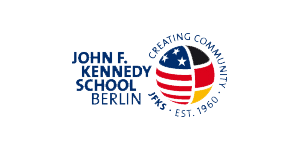At the John F. Kennedy School, German is taught as a mother tongue (D1) and partner language (D2-4). As a bilingual and bicultural school, our curriculum focuses not only on the development of skills and abilities in German, but also on the development of tolerance towards others and an understanding of individual and cultural characteristics and differences.
In order to encourage students’ interest and motivation, the German department offers a variety of learning opportunities outside the classroom:
- Projects (e.g. film project, book project, comic project, poetry slam, buddy program)
- Excursions (e.g. “Literary Walk”, Weimar, Leipzig Book Fair, Berlin Wall Memorial, Hohenschönhausen Memorial, Marienfelde Reception Center Memorial, district library)
- Course trips (e.g. partner language students travel to Nuremberg)
- Attending theater performances (according to the current Berlin theater schedule)
- Readings (e.g. “internationales literaturfestival berlin”, author readings on the JFKS campus)
- Departmental library with books for younger students and introduction to library research
- Long-term 10th grade student exchange with Trinity HS in Euless, Texas (Dallas/Ft. Worth / GAP)
The internal school curriculum for the mother-tongue German classes in years 7-10 is based on the curricula, educational standards and examination regulations of the Berlin Senate. The weekly schedule is four lessons per week in years 7 and 8 and five lessons per week in years 9 and 10. Successful completion of the MSA (Mittlerer Schulabschluss), which consists of a presentation examination and written examinations in the main subjects, enables the transfer to the “Oberstufe”, which begins in year 11. At this point, there is also an external differentiation within the mother-tongue German classes. Students must choose between a basic and advanced course if they wish to take the Abitur at the end of Year 12. Partner tongue students can also take the Abitur, but only with an oral examination. A written examination is not possible for our partner language students.
All students with English mother tongue (unless they are enrolled in two mother tongue classes) regularly participate in the German partner language program.
The German partner tongue program at the high school comprises a range of courses offered in grades 7 to 12. The German partner tongue program leads to the German Abitur (see above) and/or the American High School Diploma. The level of expectations and performance standards in the partner tongue program reflect the school’s goal of bilingualism. Four different levels of instruction are offered at each grade level, so that native English speakers with little or no knowledge of German can be admitted to each grade level:
– Beginner (D4: duration 1 year)
– Lower level (D3b: 1 year)
– Intermediate level (D3a: 2 years)
– Advanced (D2)
To facilitate correct placement, newly admitted students with English as their mother tongue are tested to determine their language level in the German partner tongue.
D3a and D2 upper level courses (Oberstufe, grades 11 and 12) are Advanced Placement (AP) courses.
Students who wish to take the German Abitur must be enrolled in the highest German partner tongue course (Advanced Placement – D2) by the beginning of grade 11 at the latest. They must also take the German exam (MSA) at the end of year 10.
Students in D2 in Year 7 choose either French or Spanish to fulfill the foreign language requirements for the German Abitur. Students who start D2 later than 7th grade must take Spanish in 8th grade to fulfill the foreign language requirement.
The performance standards of the “German as a Partner Tongue” program are linked to the standards of the Common European Framework of Reference for Languages. The German partner language targets the C1 standard in the diploma program and the C2 standard in the Abitur program.
